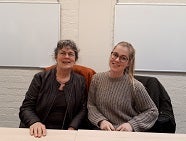Using Web of Science and University Library databases
Lieke is likewise very enthusiastic: ‘I would definitely recommend this course to other students, so they can refresh and improve their knowledge about searching effectively. The Academic Skills course during my pre-Master's programme did actually teach me how to search for literature, but that was a while ago. Until now, I mostly stuck to Google Scholar, browsing through some archives and seeing what I could dig up using LibSearch. I mostly found a lot of books that way. I then checked the references in those books to find even more books. Today, I learned how to use online databases to find literature, and which databases I can use, such as the multidisciplinary Web of Science database and the specialised databases that the University Library is subscribed to.’
Dissecting the research question into search terms
Marja: ‘Searching the databases helps you find more up-to-date articles, which lecturers expect you to use. I now have a better idea of how to do this’. Lieke adds: ‘For me, the greatest eye-opener was seeing how you could systematically design your search strategy by dissecting the research question into multiple search terms, and then coming up with synonyms for each of those. I'm also definitely going to use Boolean Searching to help narrow down the search results!’
Using Google as a means of verification, rather than as a search machine
‘I thought the explanation about which databases work best for which purposes and how to check whether an article is really an academic publication was also really useful, and quite interesting’, Marja says. ‘It is important to consider the reliability of the information you find with a critical eye. For example, we learned that Google is not a good place to start searching for literature. However, once you have used Web of Science or some other more reliable search engine to find publications, you can use Google to verify whether those publications are really academic by looking up reviews of the relevant articles. Also, you can check the number of citations in Web of Science as a measure of a publication's quality.’
Forwards snowballing
Rick Vermunt, the information specialist who teaches the workshop, explains that, ‘Looking at the people who have cited the article often leads you to other useful publications. We call this forwards snowballing’. Rick ends the workshop with the suggestion that the participants create an account for the databases they use. ‘Such accounts are often free, like one for Web of Science, and they allow you to save your search strategy. That way, you can continue at home.’
Endnote as a tool for source references and reference lists
Finally, he also recommends that they attend the University Library workshop on Endnote. ‘This software program lets you save the literature and literature references you have found, allowing you to build up a personal database filled with bibliographic data.’
